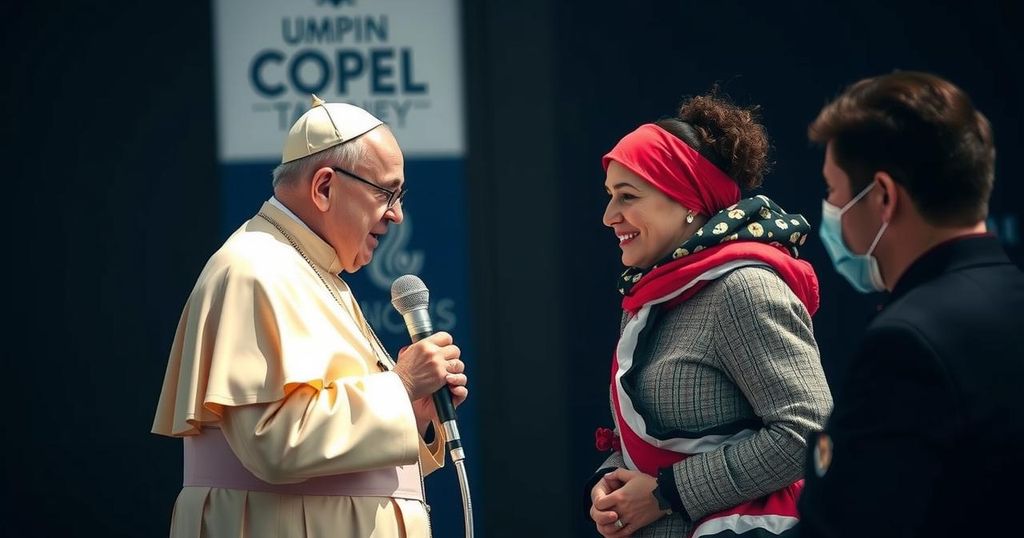COP29 Controversy: Vatican Blocks Women’s Rights Discussions Amid Gender Row
At COP29, a coalition led by the Vatican has obstructed discussions on women’s rights and gender-related language in climate agreements, jeopardizing support for women disproportionately impacted by climate change. This controversy arises as countries aim to update the Lima Work Programme on Gender, with aid organizations warning that the lack of agreement could delay vital assistance for women. The dispute underscores broader global tensions surrounding gender and LGBTQ+ rights amidst international negotiations.
At the COP29 climate summit in Azerbaijan, a significant controversy has erupted as the Vatican aligns with a coalition of countries—including Saudi Arabia, Russia, Iran, and Egypt—to block discussions on women’s rights in relation to climate change. This obstruction is particularly concerning because it stymies efforts aimed at advancing financial and institutional support for women, who are disproportionately affected by climate-related issues. The opposing nations vehemently object to references to “gender,” fearing it may inadvertently encompass transgender individuals, thus threatening a decade-long initiative known as the Lima Work Programme on Gender. Charities such as ActionAid underscore the urgency of incorporating women’s perspectives and needs into climate initiatives, noting that women and girls constitute roughly 80% of those displaced by climate crises. In the proposed updates to the UN action plan, which has been in place for ten years, it is critical to acknowledge the varying experiences of women affected by climate change, differentiated by factors such as gender, age, and race. However, dissent from the Vatican and its counterparts has stalled this essential progress. Colombia’s environment minister, Susana Muhamad, voiced distress over the deadlock, asserting, “It is unacceptable” and stressing that Latin American nations are ‘working very hard’ to ensure that women’s rights are preserved in the negotiations, despite resistance. The United Nations has projected that climate change will exacerbate food insecurity, negatively impacting millions more women than men by 2050. Aid organizations claim that the ongoing disagreements amidst the COP29 discussions jeopardize the future support mechanism that is crucial for women facing the climate emergency. Furthermore, a glaring lack of representation of women in these negotiations—only 36% of delegates in previous summits have been female—serves to silence the voices that are central to these conversations, thereby consistently leading to outcomes that do not reflect the lived realities of women subjected to climate impacts. The urgency for an amended framework is evident, as the existing UN programme on gender and climate is set to expire at the end of the year; without a new agreement, a critical support structure may disintegrate.
The backdrop of this controversy at COP29 revolves around the longstanding acknowledgment that climate change disproportionately affects women, predominantly due to entrenched socio-economic inequalities. Over the last decade, countries have recognized the necessity of addressing these gendered impacts through dedicated frameworks, such as the Lima Work Programme on Gender. The sudden resistance from the Vatican and its allies suggests a shifting global attitude that threatens the progress made in recognizing and supporting women’s rights in climate policy. Furthermore, the issues at play reflect larger societal debates regarding LGBTQ+ rights and gender identity, which complicate the landscape of international negotiations surrounding climate action and advocacy for vulnerable populations.
In summary, the tensions surrounding the omission of gender-specific language in discussions at COP29 signal a significant step backward in the fight for women’s rights within climate change frameworks. Key players such as the Vatican, alongside other nations, are impeding progress despite overwhelming evidence of the impact of climate change on women and girls. As the deadline for a new UN initiative approaches, the consequences of these disputes threaten to undermine the critical support that women urgently need to adapt to climate challenges.
Original Source: www.bbc.com




Post Comment